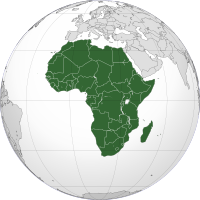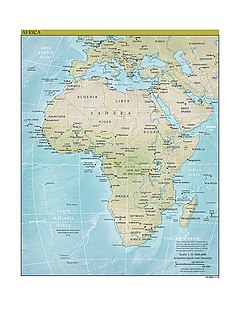
Africa is the world's second largest and second most populous continent, after Asia. At about 30.2 million km² (11.7 million sq mi) including adjacent islands, it covers 6% of the Earth's total surface area and 20.4% of the total land area.With 1.0 billion people (as of 2009, see table) in 65 territories (including 54 recognized states), it accounts for about 14.72% of the world's human population.
The continent is surrounded by the Mediterranean Sea to the north, both the Suez Canal and the Red Sea along the Sinai Peninsula to the northeast, the Indian Ocean to the southeast, and the Atlantic Ocean to the west. The continent includes Madagascar and various archipelagoes and has 54 sovereign states ("countries") and two states with limited recognition.
| Area | 30,221,532 km2 (11,668,599 sq mi) |
|---|---|
| Population | 1,022,234,000[1] (2010, 2nd) |
| Pop. density | 30.51/km2 (about 80/sq mi) |
| Demonym | African |
| Countries | 56 (list of countries) |
| Dependencies | |
| Languages | Languages of Africa |
| Time Zones | UTC-1 to UTC+4 |
| Largest cities | List of metropolitan areas in Africa List of cities in Africa |
Africa, particularly central Eastern Africa, is widely regarded within the scientific community to be the origin of humans and the Hominidae clade (great apes), as evidenced by the discovery of the earliest hominids and their ancestors, as well as later ones that have been dated to around seven million years ago – including Sahelanthropus tchadensis, Australopithecus africanus, A. afarensis, Homo erectus, H. habilis and H. ergaster – with the earliest Homo sapiens (modern human) found in Ethiopia being dated to circa 200,000 years ago.
Africa straddles the equator and encompasses numerous climate areas; it is the only continent to stretch from the northern temperate to southern temperate zones.The African expected economic growth rate is at about 5.0% for 2010 and 5.5% in 2011.
